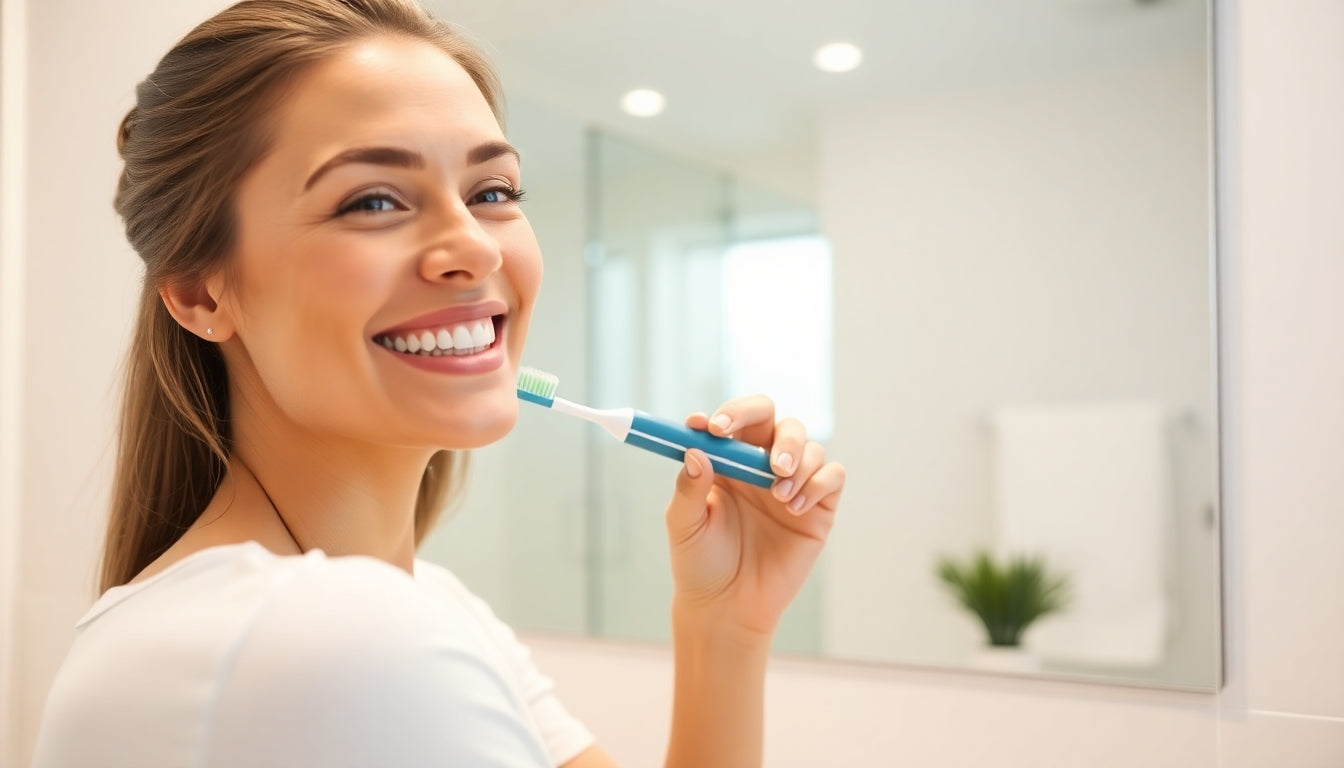A radiant smile is not only a business card, but also a reflection of our health. Unfortunately, even the most meticulous dental care can be threatened by a stubborn enemy: tartar. Let's delve deep into the fascinating world of tartar removal, explore the causes, examine the costs and share tips on how you can restore your smile to its former glory.
The background of tartar: Where does it come from?
Tartar, the annoying nuisance on our teeth, is not just a cosmetic problem. In order to penetrate the phenomenon, we must address the causes. The main culprit is the infamous plaque, a sticky accumulation of bacteria that constantly forms on our teeth. If plaque is not removed thoroughly, over time it turns into hard, yellowish tartar.
The main weapon against these dental enemies? Thorough oral hygiene. Regular brushing , flossing, and mouthwash are crucial to eliminating plaque before it turns into tartar. But other factors also favor this uninvited guest, including smoking, unhealthy diet and genetic predisposition.
The costly enemy in the mouth: tartar removal costs
Tartar may seem tiny, but the cost of removing it can be significant. The financial burden varies depending on the region, dental practice and the severity of the problem. On average, professional tartar removal costs between 80 and 200 euros. Additional treatments, such as teeth polishing or fluoride treatments, can further increase the bill.
But before you shy away from the supposedly high costs, remember that prevention is often cheaper than cure. Regular check-ups and thorough oral hygiene can help avoid expensive tartar removal and protect your wallet.
Tips for effective tartar prevention
Preventing tartar doesn't start in the dentist's chair, but in your bathroom. Here are detailed tips to effectively prevent tartar and keep your smile bright in the long term:
- Thorough oral hygiene: your daily ritual
The basis of tartar prevention is thorough oral hygiene. Invest time in your daily dental care by brushing your teeth thoroughly at least twice a day. Use a soft-bristled toothbrush to protect tooth enamel and use a fluoride toothpaste to strengthen teeth. Don't forget to also clean your tongue and palate to avoid hiding places for bacteria.
- Dental floss and mouthwash: The invisible cleaners
The use of dental floss is crucial to thoroughly clean the spaces where the toothbrush cannot reach. Mouthwashes with antibacterial properties can also help keep the oral flora in check. Make sure to incorporate dental floss and mouthwash into your daily routine to avoid giving plaque a chance to solidify.
- Healthy eating: the power of food
A balanced diet not only contributes to your overall health, but also to your dental health. Reduce your consumption of sugary foods and drinks as sugar is the main food for bacteria in your mouth. Munch on crunchy vegetables and fresh fruits that are not only healthy but also help remove plaque.
- Regular dental visits: early intervention
Your dentist is your partner in tartar prevention. Regular checks enable early detection of plaque and tartar. Dentists can not only remove tartar professionally, but can also give recommendations for your individual dental care.
- Electric toothbrushes: technology as support
Modern technology can take your oral hygiene to a new level. Electric toothbrushes with oscillating and rotating movements remove plaque more effectively than traditional manual toothbrushes. Most electric toothbrushes also have timers that ensure you stick to the recommended two-minute brushing time.
- Professional teeth cleaning: regular deep brushing
A professional teeth cleaning at the dentist should be part of your dental care at least once a year. Not only is tartar removed, but also plaque and discoloration that accumulates over time. This regular deep brushing is an investment in the long-term health of your teeth.
- Individualized care: Your mouth, your needs
Every mouth is unique, so care should be tailored accordingly. Consult your dentist to develop a customized dental care routine tailored to your specific needs. This could include special toothpastes, mouthwashes or other aids.
Electric toothbrushes: The trump card in the fight against tartar?
Technological progress has not only revolutionized our communication, but also affects dental care. Electric toothbrushes are no longer uncommon in more and more bathrooms. But does this modern technology actually offer a decisive advantage in the fight against tartar?
Analytically viewed and supported by scientific studies, it shows that electric toothbrushes are more effective at removing plaque than conventional manual toothbrushes. The oscillating and rotating movements of these electrical wonders reach hard-to-reach places in the oral cavity better, which significantly reduces the formation of plaque and therefore tartar.
Another impressive advantage is the time efficiency of electric toothbrushes. Many models have preset timers that ensure you stick to the recommended two-minute brushing time. This automated precision is not only user-friendly, but can also help to virtually nip tartar in the bud.
In addition to the widespread rotary models, sonic toothbrushes have also found their place in many bathrooms in recent years. Sonic toothbrushes work with high-frequency vibrations that are particularly gentle on the gums, but extremely effective at removing plaque.
One advantage of sonic toothbrushes is that they are gentle on the gums, which is particularly important for people with sensitive gums. The gentle vibrations help loosen plaque without putting undue strain on the gums.
Despite the many advantages of electric toothbrushes, be they rotary or sonic toothbrushes, it is important to emphasize that correct use and regular replacement of the brush attachments are essential. Electric toothbrushes are not just a technological gimmick, but an effective tool in the fight for optimal oral health. Your choice between rotation or sound should be guided by personal preferences and possible gum sensitivity, but in both cases one thing is certain: electric toothbrushes are undoubtedly the trump card in the fight against tartar.
Plaque or tartar? The most important differences at a glance
|
characteristics |
Tartar |
dental plaque |
|
nature |
Hard, mineralized |
Soft, sticky |
|
Origin |
Forms from hardened plaque |
Accumulation of bacteria and food residues |
|
Color |
Yellowish to brownish |
Whitish to slightly yellowish |
|
Location |
Mainly at the gum line and between the gums |
Anywhere on the tooth surface, especially in hard-to-reach places |
|
distance |
Requires professional dental treatment |
Remove by thoroughly brushing, flossing and using mouthwash at home |
|
degree of hardness |
Hard and sticky |
Soft and easily soluble |
|
Effects |
Can lead to gum inflammation and tooth decay |
Initial stage of plaque, leads to tooth decay and gum problems |
|
visibility |
Often clearly visible and palpable |
Often not visible initially, but can be recognized by discoloration |
|
Prevention |
Regular professional teeth cleaning and good oral hygiene at home |
Thorough oral hygiene, regular dental visits and a healthy diet |
FAQ: Everything you want to know about tartar
How much does tartar removal cost?
The cost of tartar removal varies depending on the region and dental practice. On average, you can expect costs between 80 and 200 euros. Additional treatments may further affect the price.
How can you remove tartar yourself?
It is advisable to leave tartar removal to a professional. Do not attempt to remove tartar yourself, as improper methods can result in tooth or gum damage. However, thorough oral hygiene at home is the key to prevention.
How painful is tartar removal?
Most people find tartar removal to be painless. There may be slight sensations of pressure or vibration. However, if you fear severe pain, talk to your dentist about possible pain relief measures.
How often does the health insurance company pay for tartar removal?
Statutory health insurance companies usually cover the costs of professional teeth cleaning once a year. If medically necessary, such as periodontitis, further treatments can be provided. It is advisable to clarify the exact conditions with your health insurance company.
What is the difference between teeth cleaning and tartar removal ?
Teeth cleaning refers to the removal of plaque, while scaling involves the removal of plaque (tartar) that has already hardened. Both are part of professional oral hygiene, but tartar removal is more invasive.
Which toothpaste works best against tartar?
There are special toothpastes that aim to reduce tartar buildup. They often contain ingredients such as fluoride or enzymes. Consult your dentist to find a toothpaste that meets your individual needs.
What reduces tartar?
Thorough oral hygiene, regular visits to the dentist and a balanced diet help to reduce tartar formation. Electric toothbrushes can also be effective at removing plaque.
Why do I get tartar so quickly?
The tendency to form tartar can be genetic. Smoking, poor oral hygiene, unbalanced diet and certain medical conditions can also have an impact. Discuss this with your dentist to develop individual preventative measures.
Conclusion: A radiant smile without tartar
Worrying about tartar may initially seem like a chore, but the happy reality is that this pesky guest is preventable. A radiant smile, free of unwanted tartar, is not a utopia, but the result of consistent dental care.
The cornerstones of this success can not only be found in the dentist's office, but also begin in your own bathroom. Conscientious oral hygiene is key. Regular brushing, flossing, and mouthwash are the first lines of defense against plaque, which can ultimately lead to tartar.
Regular visits to the dentist should not be viewed as a chore, but rather as a partnership in your oral health. Professional teeth cleaning, supported by the latest technologies such as electric toothbrushes, is an effective way to prevent tartar.
It is important to understand that fighting tartar is not just about the cost of dental visits and treatments. Protecting your health is much more important. Tartar is not just a cosmetic problem; it can also lead to serious dental disease.
Therefore, invest consciously in your oral hygiene. Good dental care is not a burden, but an investment in your quality of life. With a radiant smile, free of tartar, combined with the knowledge that you are actively helping to maintain the health of your teeth, you will not only gain aesthetically, but above all also score points in terms of health.
Think long-term, think health-consciously, and your smile will not only shine, but also tell the story of careful dental care - a story of prevention, partnership with your dentist and conscious use of modern tools. A bright, tartar-free smile is not only possible, but also achievable with the right care and attention to your oral health. Invest in your smile and it will become a reflection of your overall health care.





